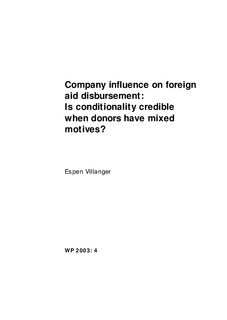| dc.contributor.author | Villanger, Espen | |
| dc.date.accessioned | 2008-02-22T11:13:38Z | |
| dc.date.accessioned | 2017-03-29T09:13:29Z | |
| dc.date.available | 2008-02-22T11:13:38Z | |
| dc.date.available | 2017-03-29T09:13:29Z | |
| dc.date.issued | 2003 | |
| dc.identifier.isbn | 82-8062-050-8 | |
| dc.identifier.issn | 0804-3639 | |
| dc.identifier.uri | http://hdl.handle.net/11250/2436148 | |
| dc.description.abstract | When donors enforce conditionality upon recipients who do not implement the conditions, companies can suffer from cancellation of their contracts with the recipient when aid dries up. A strategic recipient may avoid implementing controversial conditions by only granting a contract to a company that puts pressure on the donor to keep aid flowing. In our model, each of these three agents takes account of each of the two other agents’ actions. We show that this triadic structure can be crucial when explaining recipients’ use of companies to influence donors to give aid unconditionally, and offer a time-consistent explanation for the failure of conditionality. | |
| dc.language.iso | eng | |
| dc.publisher | Chr. Michelsen Institute | |
| dc.relation.ispartofseries | CMI Working paper | |
| dc.relation.ispartofseries | WP 2003: 4 | |
| dc.subject | Triadic | |
| dc.subject | Foreign aid | |
| dc.subject | Credibility | |
| dc.subject | Fungibility | |
| dc.subject | Samarian's dilemma | |
| dc.subject | JEL classification: E61, F35 | |
| dc.title | Company influence on foreign aid disbursement: Is conditionality credible when donors have mixed motives? | |
| dc.type | Working paper | |
